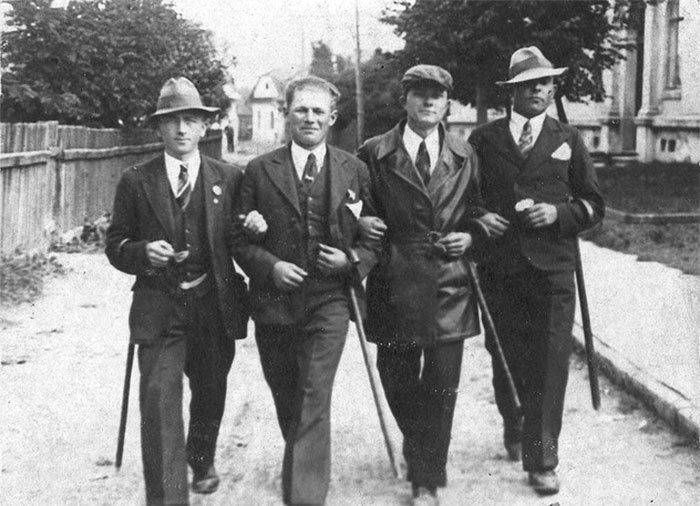Origin
 In Ukrainian folklore, batiary are often romanticized - there are numerous legends and songs that glorify batiary that helped children of Lviv during the WWII. Others, on the contrary, state that batiary were close to charlatans who knew no measure in their jokes. As always, the truth lies somewhere in between. To start with, it's necessary to mention that batiary weren't exclusively Lviv's phenomenon: the subculture thrived in all Galician cities and was popular among Ukrainians, Jews and Poles.
In Ukrainian folklore, batiary are often romanticized - there are numerous legends and songs that glorify batiary that helped children of Lviv during the WWII. Others, on the contrary, state that batiary were close to charlatans who knew no measure in their jokes. As always, the truth lies somewhere in between. To start with, it's necessary to mention that batiary weren't exclusively Lviv's phenomenon: the subculture thrived in all Galician cities and was popular among Ukrainians, Jews and Poles.
However, Lviv batiary left their trace in the history - largely thanks to the unique city vibe and the scale of local batiary tricks. The unusual sounding term is, most likely, a borrowed Hungarian word betyár, which means outlaw, trickster and a rowdy person. The term was popularized during the Austria-Hungarian reign in the 19th century when the Hungarian policemen gave the name for the already-existing subculture.
Culture
 Image: Batiary from Luchakiv, dated 1928
Image: Batiary from Luchakiv, dated 1928
Lviv as a central Western Ukrainian city gathered batiary since the Austro-Hungarian times to the Polish reign in the 1930s. The heart of batiary subculture was located in Lychakiv, which is nowadays a part of the eastern Lychakivskyi District of Lviv. The place was a home for the batiary intelligence: professors, musicians and judges. They were dressed in the latest fashion and wore neckties.
"Prohulianka" Park, located in the Lychakiv district, was a popular meeting place for the less refined representatives of the subculture. At the time, this park was full of breweries and small pubs, which attracted people from all over the city. As it often happens with subcultures, social class and age didn't matter for batiars — the local tricksters even had a slogan: "Love Lviv, love the women and love the laughs", which accurately sums up the essence of the subculture.
Batiary are cemented in the history thanks to the numerous pranks. For instance, one of the favorite batiar tricks was ordering beer "for everyone in this bar". However, after the order was placed, batiar quickly left the building, leaving the guests to pay on their own. The following trick was sometimes performed in the agreement with the pub's owner, who provided beer for batiar's marketing services. Batiary enjoyed cinematography as well: when the first cinemas appeared in Lviv, they became one more place of gathering.
During 1933-1939, Polish radio transmitted the batiar program called Wesoła lwowska fala ("Lviv's fun wave") lead by Polish actors Henryk Fogelfanger and Kazimierz Wajda. They later played batiary in a 1939 movie Włóczęgi and added their impression into the collective mind. One might wonder how batiary earned money to live. Apart from numerous tricks and occasional robbery, batiary worked on low-qualification jobs at masonry and construction, sold papers as well as stolen flowers, dogs and cats.
Legacy
 Batiar's tricks were reflected in dozens of folklore songs and many of them were written by the subculture members themselves. One of the most famous batiar hymns is the 1939 song Tylko we Lwowie, which later became the unofficial hymn of the city. You can listen to the Ukrainian version of the song by the contemporary singer and translator Viktor Morozov:
Batiar's tricks were reflected in dozens of folklore songs and many of them were written by the subculture members themselves. One of the most famous batiar hymns is the 1939 song Tylko we Lwowie, which later became the unofficial hymn of the city. You can listen to the Ukrainian version of the song by the contemporary singer and translator Viktor Morozov:
Nowadays the batiary subculture is being actively revived and re-invented: the contemporary Lviv hipsters keep the refined style and love for jokes while leaving the criminal element in the past. One of the events when batiars gather in the city is the bicycle promenade "Batiary on Rovers". In 2018, the retro promenade celebrated the 5th anniversary. Batiary barbershop located in Lviv takes part in reviving the fashion of the old subculture. Finally, ten years ago Lviv City Administration approved the official Batiar Day on May 1. The event has a mischievous slogan "Batiary of the world, unite!" It's no wonder that a unique city like Lviv became home for a no less unique subculture.
Sources: zaxid.net, tvoemisto.tv.
Photo sources: Батяри на Роверах Facebook page, lwow.home.pl, amazing-ukraine.com. All images belong to their rightful authors.









